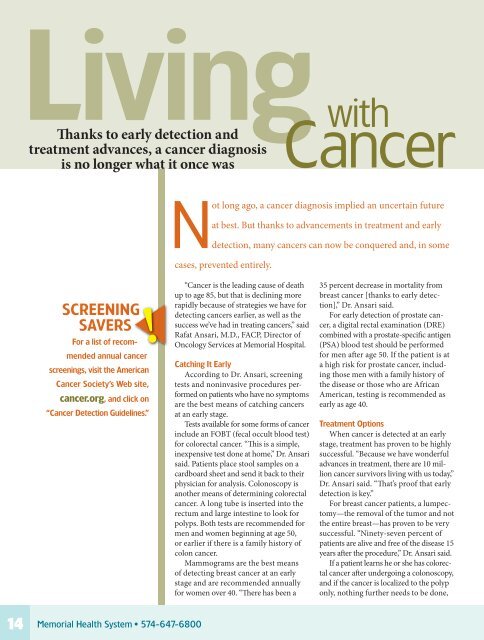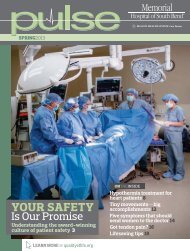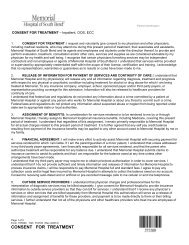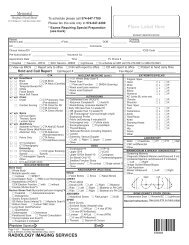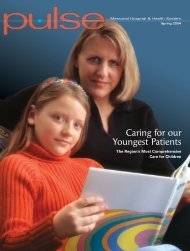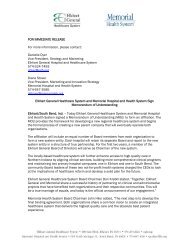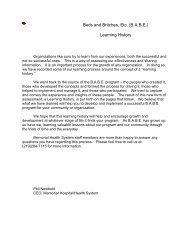Fall 2005 - Memorial Hospital of South Bend
Fall 2005 - Memorial Hospital of South Bend
Fall 2005 - Memorial Hospital of South Bend
Create successful ePaper yourself
Turn your PDF publications into a flip-book with our unique Google optimized e-Paper software.
Living with<br />
Thanks to early detection and<br />
treatment advances, a cancer diagnosis<br />
is no longer what it once was<br />
Cancer<br />
Not long ago, a cancer diagnosis implied an uncertain future<br />
at best. But thanks to advancements in treatment and early<br />
detection, many cancers can now be conquered and, in some<br />
cases, prevented entirely.<br />
SCREENING<br />
SAVERS<br />
For a list <strong>of</strong> recommended<br />
annual cancer<br />
screenings, visit the American<br />
Cancer Society’s Web site,<br />
cancer.org, and click on<br />
“Cancer Detection Guidelines.”<br />
!<br />
“Cancer is the leading cause <strong>of</strong> death<br />
up to age 85, but that is declining more<br />
rapidly because <strong>of</strong> strategies we have for<br />
detecting cancers earlier, as well as the<br />
success we’ve had in treating cancers,” said<br />
Rafat Ansari, M.D., FACP, Director <strong>of</strong><br />
Oncology Services at <strong>Memorial</strong> <strong>Hospital</strong>.<br />
Catching It Early<br />
According to Dr. Ansari, screening<br />
tests and noninvasive procedures performed<br />
on patients who have no symptoms<br />
are the best means <strong>of</strong> catching cancers<br />
at an early stage.<br />
Tests available for some forms <strong>of</strong> cancer<br />
include an FOBT (fecal occult blood test)<br />
for colorectal cancer. “This is a simple,<br />
inexpensive test done at home,” Dr. Ansari<br />
said. Patients place stool samples on a<br />
cardboard sheet and send it back to their<br />
physician for analysis. Colonoscopy is<br />
another means <strong>of</strong> determining colorectal<br />
cancer. A long tube is inserted into the<br />
rectum and large intestine to look for<br />
polyps. Both tests are recommended for<br />
men and women beginning at age 50,<br />
or earlier if there is a family history <strong>of</strong><br />
colon cancer.<br />
Mammograms are the best means<br />
<strong>of</strong> detecting breast cancer at an early<br />
stage and are recommended annually<br />
for women over 40. “There has been a<br />
35 percent decrease in mortality from<br />
breast cancer [thanks to early detection],”<br />
Dr. Ansari said.<br />
For early detection <strong>of</strong> prostate cancer,<br />
a digital rectal examination (DRE)<br />
combined with a prostate-specific antigen<br />
(PSA) blood test should be performed<br />
for men after age 50. If the patient is at<br />
a high risk for prostate cancer, including<br />
those men with a family history <strong>of</strong><br />
the disease or those who are African<br />
American, testing is recommended as<br />
early as age 40.<br />
Treatment Options<br />
When cancer is detected at an early<br />
stage, treatment has proven to be highly<br />
successful. “Because we have wonderful<br />
advances in treatment, there are 10 million<br />
cancer survivors living with us today,”<br />
Dr. Ansari said. “That’s pro<strong>of</strong> that early<br />
detection is key.”<br />
For breast cancer patients, a lumpectomy—the<br />
removal <strong>of</strong> the tumor and not<br />
the entire breast—has proven to be very<br />
successful. “Ninety-seven percent <strong>of</strong><br />
patients are alive and free <strong>of</strong> the disease 15<br />
years after the procedure,” Dr. Ansari said.<br />
If a patient learns he or she has colorectal<br />
cancer after undergoing a colonoscopy,<br />
and if the cancer is localized to the polyp<br />
only, nothing further needs to be done,<br />
14<br />
<strong>Memorial</strong> Health System • 574-647-6800


